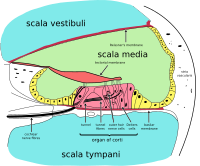
Photo from wikipedia
BACKGROUND There is a global rise in maternal syphilis and infants born with congenital syphilis. CLINICAL FINDINGS This case report presents a 32-week gestation premature male infant with initial clinical… Click to show full abstract
BACKGROUND There is a global rise in maternal syphilis and infants born with congenital syphilis. CLINICAL FINDINGS This case report presents a 32-week gestation premature male infant with initial clinical findings significant for respiratory failure as well as blueberry muffin spot rash and hepatosplenomegaly, which are consistent with congenital syphilis. PRIMARY DIAGNOSIS This case study is unique in that the diagnosis of congenital neurosyphilis was demonstrated despite negative maternal serology because of the prozone phenomenon. This phenomenon refers to an overwhelming acute infection that interferes with testing by antibody flocculation or clumping of antibodies, causing a false-negative result and allows an infection such as syphilis to go undetected during pregnancy when Venereal Disease Research Laboratory test is performed. INTERVENTIONS The infant received a 10-day course of aqueous penicillin G 150,000 U/kg every 8 hours per Centers for Disease Control and Prevention and Redbook recommendations for congenital neurosyphilis. OUTCOMES The infant was discharged home on day of life 38 and was followed as an outpatient with serial rapid plasma reagin titers confirming adequate treatment of congenital neurosyphilis. He was also referred to the high-risk infant clinic to monitor for developmental milestones secondary to prematurity and central nervous system infection. PRACTICE RECOMMENDATIONS Providers within the neonatal setting should consider early congenital syphilis testing on infants with similar clinical presentation regardless of negative maternal testing.
Journal Title: Advances in Neonatal Care
Year Published: 2018
Link to full text (if available)
Share on Social Media: Sign Up to like & get
recommendations!